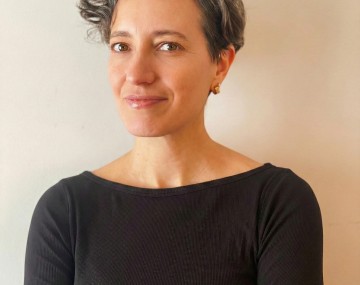Exploring the interdisciplinary field of critical development studies
The Critical Development Studies Seminar Series is a graduate student-led effort that aims to provide space for junior scholars to share innovative research and discuss emergent debates within critical development studies.
Invited speakers cover a range of geographical areas, disciplinary backgrounds, and research topics. Examples of potential topics include agroecology and food justice issues, state-building, land and labor, extractivist politics, the gendered and racial dynamics of ongoing capitalist development, and the political ecological histories of the global development project. The target audience for the series is graduate students and faculty interested in critical development studies both within the Cornell community as well as external scholars.
Seminar organizers for 2025-26 are Eve Devillers, Jessie Whittaker Mayall, Aaron Benanav, and Mariah Doyle-Stephenson.
Spring 2026 Seminars
Presentation of a draft dissertation chapter on Agricultural Motorization in Post-Colonial Morocco (Morocco’s Operation Labour 1957-1961)

Boma and Kuboma: Soil, Housing, and Belonging in Rural Western Kenya

Research presentation ‘The Fisherfolk Feeding the Megacity: Food Security, Livelihoods and Value Chains in Lagos’ Informal Waterfront Settlements’

From Plantation to Prison: The Origins of Mass Incarceration

Technological innovation and desired futures in the rural United States

Research proposal presentation/workshop
Seminar archive
- From Points to Pixels: Feminist Approaches to Mapping with Meghan Kelly, Syracuse University
- Human Health and Wellbeing in an Era of Climate Change and Socio-political Instability with Brian Thiede, The Pennsylvania State University
- Sacrifice Flows: Racial Capitalism and Uneven Geographies of Development with Kimberley Thomas, Temple University
- Higher Education as a Right: Challenges and Strategies in the Uruguayan Public Universities with with María Eugenia Bové Gimenez, Universidad de la República, Uruguay
- Critical Examination of Information and Communication Technology for Development (ICT4D) with Alejandro Mayoral Baños of the Indigenous Friends Foundation
- Reparative Planning, Racial Capitalism, and Ideology with Rashad Williams, Assistant Professor of Race & Social Justice in Public Policy at the University of Pittsburgh
- Local Resistance to Climate Change Adaptation: Hindrance or Opportunity? with Michael Mikulewicz, Assistant Professor at the SUNY College of Environmental Science and Forestry
- The African Futures Project & Resource Inequality and the Quest for Socioeconomic Mobility: The Ghanaian Case with Tristan Ivory, Cornell University
- Re-Earthing Sapelo: Abolition Ecology and the Struggle to Save the Land with Nik Heynen, University of Georgia
- Playing with Time: The Temporalities of Agrarian Change and Climate Instability in Rural India with Marcus Taylor, Queen's University, Kingston, Canada
- Cooking and Cooling in an Age of Global Warming with Amita Baviskar, Ashoka University
- Rocking Qualitative Social Science with Ashley Rubin, Associate Professor of Sociology at the University of Hawai‘i at Mānoa
- Plantation Liberalism: Personhood and Property between Philippine Mindanao and the Black Atlantic with Alyssa Paredes, Assistant Professor of Anthropology at the University of Michigan, Ann Arbor
- Corruption Plots: Stories, Ethics, and Publics of the Late Capitalist City with Malini Ranganathan is Associate Professor in the School of International Service and a faculty affiliate of the Department of Critical Race, Gender, and Culture Studies at American University
- Academic Outsider with Victoria Reyes, Associate Professor in the Department of Gender & Sexuality Studies at University of California, Riverside
- Rethinking Food, Rewriting Civil Rights: Food, Power, and Black Life in the Mississippi Civil Rights Movement, with Dr. Bobby J. Smith II, sociologist and Assistant Professor in the Department of African American Studies at the University of Illinois at Urbana-Champaign
- Shifting Priorities, and how private development is transforming aid, governance, and daily life in the West Bank with Kareem Rabie, Assistant Professor of Anthropology at The University of Illinois, Chicago
- The Rentierization of Food: Regimes of Property and the Making of Chile’s Globalized Agriculture with Martín Arboleda, Assistant Professor of Sociology at the Universidad Diego Portales, Santiago de Chile
- Another Skin: Climate Adaptation and Accountability with Sarah E. Vaughn, Assistant Professor at the University of California, with the Center for Science, Technology and Medicine, The Program in Critical Theory, and the Program in Development Engineering
- Adjudicating “development”: Transnational US law and the disciplining of debtor states with Shaina Potts, Assistant Professor in the departments of Geography and Global Studies at the University of California, Los Angeles
- Revolution in development: Mexico and the governance of the global economy with Christy Thornton, Assistant Professor of Sociology and Latin American Studies at Johns Hopkins University
- Threatening Dystopias: Development, Scientific Knowledge, and Adaptation to Climate Change with Kasia Paprocki, Associate Professor in the Department of Geography and Environment at the London School of Economics and Political Science
- Water and Waste in Global South Cities with Victoria Beard, Professor in Cornell University's College of Art, Architecture and Planning
- The Plantation’s Outsides: The Work of Settlement in Kalimpong, India with Sarah Besky, cultural anthropologist and Associate Professor in the ILR School at Cornell
Cracking Appalachia: A Political-Industrial Ecology Perspective with Jennifer Baka, assistant professor of geography at Penn State
A massive industrial re-development project is underway in the wet gas regions of the Marcellus and Utica shale basins of Pennsylvania, Ohio and West Virginia. State governments have been coordinating and competing to establish a global petrochemicals industry using ethane by-products from hydraulically fractured shale gas. There are reportedly enough ethane reserves in the basins to support up to five ethane processing plants, known as crackers, each with a capacity to produce about a million tons of plastics components per year. Shell is building the first cracker plant outside of Pittsburgh after receiving a 25-year, $1.65 billion tax break from the PA government, the largest in state history. PTT Global and Braskem, two of the world’s largest petrochemical conglomerates are in the process of building crackers in OH and WV, respectively. Through the lens of political-industrial ecology, an emerging and interdisciplinary field of nature-society geography, this paper will examine the interwoven material and political practices and environmental implications of attracting global capital to Appalachia, a region long at the center of industrial development and environmental degradation within the US.
Managing Migrants: Class and Emigration from India with Rina Agarwala, Associate Professor of Sociology at Johns Hopkins University
How are sending country governments managing the out-migration or emigration of their citizens and how are migrants reacting to and reshaping sending state actions? This project employs a comparative-historical examination to answer these questions using a class lens. Contemporary global migration is not only marked by its sheer size and racial diversity, it is unprecedented in its class variation. These class variations have catalyzed countless and well-publicized challenges for state leaders in receiving countries. In sending countries, however, the class politics of out-migration is virtually unknown.
To address these questions, this project compares the Indian state’s relations with its low-skilled emigrants to the Middle East and its high-skilled emigrants to the U.S. from the 1920s to the present. Contrary to assertions that sending states’ emigration policies are merely reacting to externally-imposed “neoliberal” development models of economic growth, I argue that global emigration has long served as a proactive vector through which sending states re-shape and cement new domestic-level economic ideologies. Sending state emigration policies, therefore, do not just reflect pre-determined development goals, they shape those development goals.
In India, emigration has been used to empower some classes, while disempowering others before and after the rise of neoliberalism, thereby exposing “class” as a much bigger factor than “neoliberalism” in explaining the variations in India’s migration policies (across peoples and across time). The terms of the class-based inequities underlying India’s development ideologies have changed over time, although the inequities themselves have remained consistent. These findings not only provide a more complete picture of global migration efforts, they also expose the conditions under which migrants’ resistance efforts succeed and fail.
Bitter Ground: Smallholder Vulnerability and the Coffee Rust Epidemic in the Jamaican Blue Mountains with Kevon Rhiney, Assistant Professor in the Department of Geography at Rutgers University
Since September 2012, the Jamaican coffee industry has been grappling with the coffee leaf rust (CLR) epidemic caused by the fungal pathogen Hemileia vastatrix. The first widespread outbreak affected more than one-third of coffee plants across the island, resulting in millions of dollars in lost revenues for the sector. The emergence and spread of the disease have been linked to a confluence of factors ranging from changing climatic conditions, impacts from extreme weather events, improper farm management practices and bounded knowledge systems, and institutional and market constraints that restrict measures aimed at controlling the disease. In this talk, Kevon uses the case of the CLR epidemic to illustrate the systemic, relational and multi-scalar ways socio-ecological shocks are often disproportionately experienced by smallholders, and how these shocks in turn map onto and are routinely mediated through everyday human-environment interactions. Drawing on a mixed methods research design involving household surveys, focus groups, archival research and interviews with a range of value chain actors, he shows how smallholder responses and exposure to CLR links into broader political-economic processes that are partly responsible for creating the structural conditions that influence smallholder vulnerability to socio-ecological shocks in the first place, and often set the conditions for future impacts and vulnerabilities.

